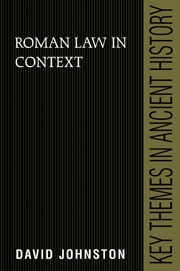4 - Property
Summary
Ownership and the means by which it is protected are the topic of the first section of this chapter. The second and third sections are devoted to land, and in particular to legal institutions providing for its exploitation and to legal remedies against the unwelcome activities of neighbours.
OWNERSHIP
Ownership (dominium) in Roman law is difficult to define, and the Romans themselves did not trouble to do this. The best approach seems to be to deal with the main ingredients of ownership and from that allow the meaning of the term to emerge. The discussion in this section does need to go into some detail, in particular about the remedies available to owners to protect their property. This is not (intended to be) pure self-indulgence: it is only from the details that a reasonably accurate picture of the security of property rights and commercial transactions such as sales can be obtained.
In particular, it is important to see how Roman law dealt with the perennial problem of stolen goods: movable property gets stolen. Often it is sold to an innocent buyer. Someone has to lose. All legal systems have to decide whether the loser should be the original owner or the innocent buyer. The choice has serious implications: on the one hand, it is important to protect existing property rights; but on the other, if buyers in good faith are liable to lose their purchases, commerce may be adversely affected.
- Type
- Chapter
- Information
- Roman Law in Context , pp. 53 - 76Publisher: Cambridge University PressPrint publication year: 1999

